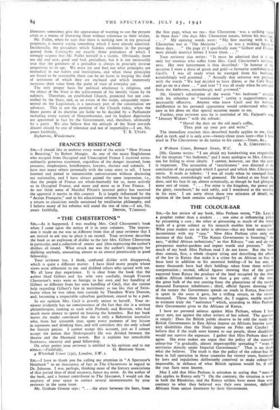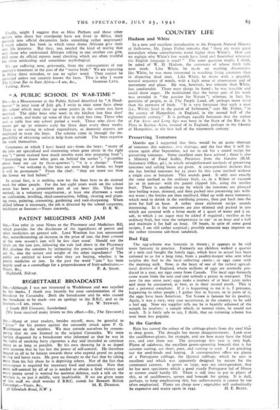THE COLOUR-BAR
Sin,—In her review of my book, Miss Perham wrote, "Dr. Leys a prophet rather than a student . . . one aims at influencing policy by presenting a case ; the other at presenting as much of the whole truth of a given subject as his research enables him to acquire. What your readers are to infer is obvious—that my book omits truth inconsistent with my "case." Now Miss Perham cites only one instance of this fault. "The Kenya Government is fostering," she says, "skilled African technicians," so that Kikuyu "can and do run prosperous market-gardens and export wattle and potatoes." HON much of my book Miss Perham read I do not know. But the bud does contain, first, a whole chapter citing and describing the effects of the law in Kenya that make it a crime for an African to buy at lease land in addition to his ancestral holding—if he has one, as many thousands have had their holdings taken from them without compensation ; second, official figures showing that of the goods exported from Kenya the produce of the land occupied by the three million African inhabitants is less than 4 per cent, of the total; the great bulk of the rest coming from the plantations of the twenty thousand European inhabitants ; third, official figures showing that of the money the Government spends on roads in Kenya, five-sixths is spent in the areas it gave, for a trifling return, to the twenty thousand. Those three facts together do, I suggest, enable readers to estimate truly the "assistance" which, according to Miss Perham, their Government gives to the Africans of Kenya.
I have no personal animus against Miss Perham, whom I have never met, nor against the other writers of her school. The question is simply: Does the British public deserve to be told the truth that British Governments in East Africa impose on Africans heavier statu- tory disabilities than the Nazis impose on Poles and Czechs? believe that if the truth were known to our people, those disabilities would not survive the exposure. I gather that Miss Perham does nui agree. She even makes me argue that the policy of the statuter1 colour-bar "is gradually, almost imperceptibly spreading" "even le territories directly under Imperial Government." That is no doubt what she believes. The truth is that the policy of the colour-bar hat been in full operation in those countries for twenty years, buttressed by laws and regulations deliberately contrived to make colour-ban impassable, in defiance of what British opinion would be, if on!! the true facts were known.
May I add that Miss Perham is mistaken in saying that "most d this applies to Kenya only "? On the contrary, the situation is worse in both the Rhodesias, and the Kenya settlers have more than once, contrary to what they believed was their own interest, defended Africans from unjust treatment by their Government.
Finally, might I suggest that as Miss Perham and those other writers who share her standpoint have not lived in Africa, their research into official documents lacks something rather important? I much admire her book in which some dozen Africans give their own life histories. But they, too, needed the kind of testing that only those who understand Africans talking to one another can give. Still more do official reports need checking which are often truthful but often misleading and sometimes mythological.
We are suffering now, grievously, from the consequences of our country's treatment in the past of the "native Irish." We are repeating in Africa those mistakes, to use no uglier word. They cannot be corrected unless our country knows the facts. That is why I wrote
The Colour Bar in East Africa.—I am, &c., NORMAN Lays. Yalding, Kent.



























 Previous page
Previous page